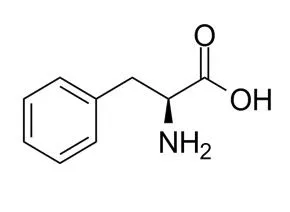| In vitro: |
| Biomed Khim. 2014 Jul-Aug;60(4):448-61. | | Microbial synthesis of deuterium labelled L-phenylalanine with different levels of isotopic enrichment by facultative methylotrophic bacterium Brevibacterium methylicum with RMP assimilation of carbon.[Pubmed: 25249528] |
METHODS AND RESULTS:
The preparative microbial synthesis of amino acids labelled with stable isotopes, including deuterium ( 2 H), suitable for biomedical applications by methylotrophic bacteria was studied using L-Phenylalanine as example. This amino acid is secreted by Gram-negative aerobic facultative methylotrophic bacteria Brevibacterium methylicum, assimilating methanol via ribulose-5-monophosphate (RMP) cycle of assimilation of carbon, The data on adaptation of L-Phenylalanine secreted by methylotrophic bacterium В. methylicum to the maximal concentration of deuterium in the growth medium with 98% 2 Н 2 O and 2% [ 2 Н]methanol, and biosynthesis of deuterium labelled L-Phenylalanine With different levels of enrichment are presented. The strain was adapted by means of plating initial cells on firm (2% agarose) minimal growth media with an increasing gradient of 2 Н 2 O concentration from 0; 24.5; 49.0; 73.5 up to 98% 2 Н 2 O followed by subsequent selection of separate colonies stable to the action of 2 Н 2 O. These colonies were capable to produce L-Phenylalanine. L-Phenylalanine was extracted from growth medium by extraction with isopropanol with the subsequent crystallization in ethanol (output 0.65 g/l).
CONCLUSIONS:
The developed method of microbial synthesis allows to obtain deuterium labelled L-Phenylalanine with different levels of isotopic enrichment, depending on concentration of 2 Н 2 O in growth media, from 17% (on growth medium with 24,5% 2 Н 2 O) up to 75% (on growth medium with 98% 2 Н 2 O) of deuterium in the molecule that is confirmed with the data of the electron impact (EI) mass- spectrometry analysis of methyl ethers of N-dimethylamino(naphthalene)-5-sulfochloride (dansyl) phenylalanine in these experimental conditions. | | Biotechnol Appl Biochem . 2018 May;65(3):476-483. | | Enhancement of l-phenylalanine production in Escherichia coli by heterologous expression of Vitreoscilla hemoglobin[Pubmed: 28872702] | | Abstract
L-Phenylalanine is an important amino acid that is widely used in the production of food flavors and pharmaceuticals. Generally, L-Phenylalanine production by engineered Escherichia coli requires a high rate of oxygen supply. However, the coexpression of Vitreoscilla hemoglobin gene (vgb), driven bya tac promoter, with the genes encoding 3-deoxy-d-arabinoheptulosonate-7-phosphate synthetase (aroF) and feedback-resistant chorismate mutase/prephenate dehydratase (pheAfbr ), led to increased productivity and decreased demand for aeration by E. coli CICC10245. Shake-flask studies showed that vgb-expressing strains displayed higher rates of oxygen uptake, and L-Phenylalanine production under standard aeration conditions was increased. In the aerobic fermentation process, cell growth, L-Phenylalanine production, and glucose consumption by the recombinant E. coli strain PAPV, which harbored aroF, pheAfbr , and tac-vgb genes, were increased compared to that in the strain harboring only aroF and pheAfbr (E. coli strain PAP), especially under oxygen-limited conditions. The vgb-expressing strain PAPV produced 21.9% more biomass and 16.6% more L-Phenylalanine, while consuming only approximately 5% more glucose after 48 H of fermentation. This study demonstrates a method to enhance the L-Phenylalanine production by E. coli using less intensive and thus more economical aeration conditions.
Keywords: Escherichia coli; Vitreoscilla hemoglobin; dissolved oxygen; feedback resistant; L-Phenylalanine; vgb. |
|






 Cell. 2018 Jan 11;172(1-2):249-261.e12. doi: 10.1016/j.cell.2017.12.019.IF=36.216(2019)
Cell. 2018 Jan 11;172(1-2):249-261.e12. doi: 10.1016/j.cell.2017.12.019.IF=36.216(2019) Cell Metab. 2020 Mar 3;31(3):534-548.e5. doi: 10.1016/j.cmet.2020.01.002.IF=22.415(2019)
Cell Metab. 2020 Mar 3;31(3):534-548.e5. doi: 10.1016/j.cmet.2020.01.002.IF=22.415(2019) Mol Cell. 2017 Nov 16;68(4):673-685.e6. doi: 10.1016/j.molcel.2017.10.022.IF=14.548(2019)
Mol Cell. 2017 Nov 16;68(4):673-685.e6. doi: 10.1016/j.molcel.2017.10.022.IF=14.548(2019)